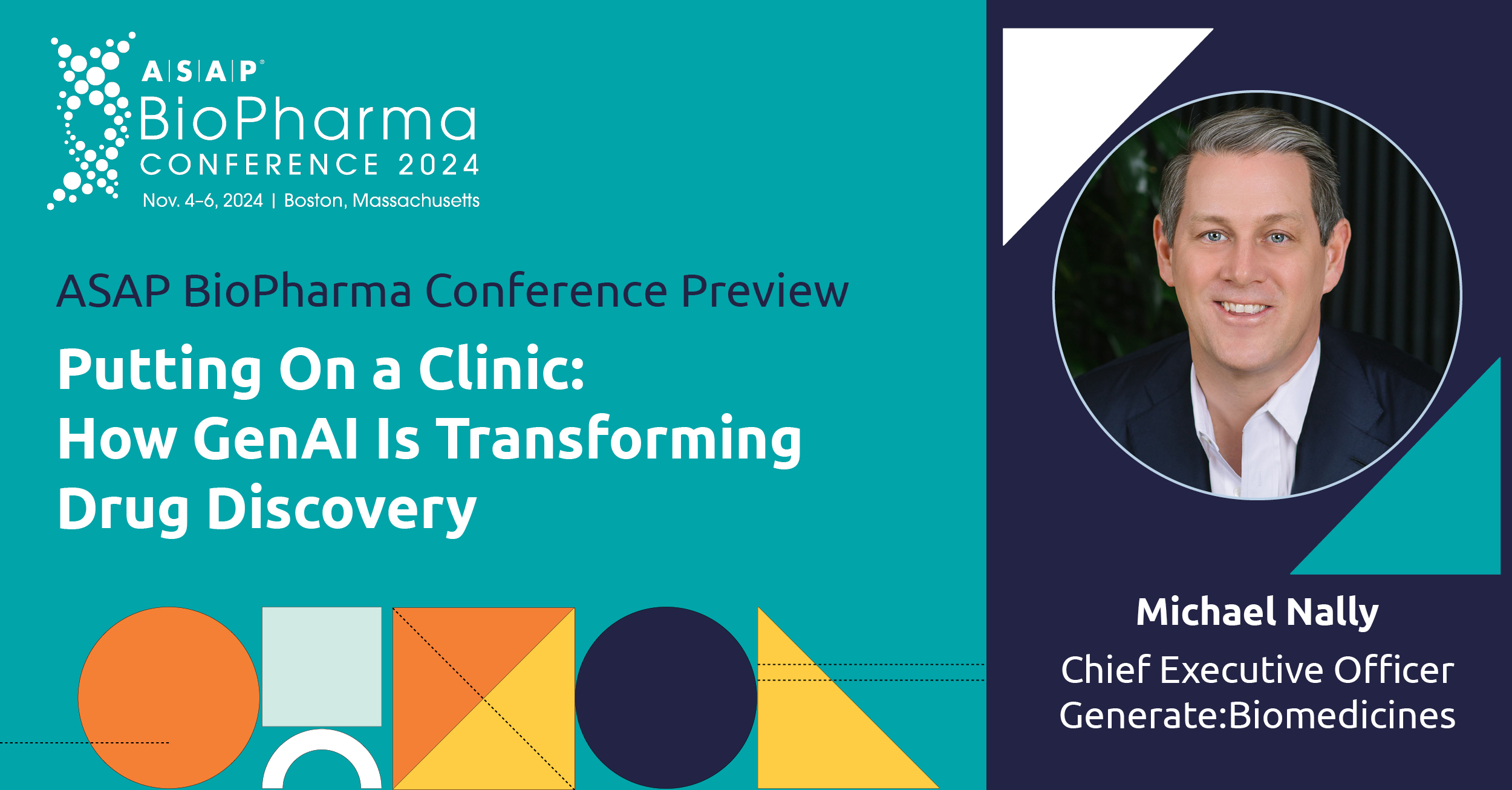Putting On a Clinic: How GenAI Is Transforming Drug Discovery
Generative AI (GenAI) has taken off fast in biopharma (see “GenAI Did Not Write This Article…or Did It?,”Strategic Alliance Quarterly, Q2 2024), particularly in the area of drug discovery, and we know it is going to upend the rest of biopharma in the years to come (see “The Future of GenAI Is Here!,” Strategic Alliance Monthly, May 2024). But where exactly are we in the journey? Behind, ahead, or keeping pace?
Every company’s answer may be different, but the 2024 ASAP BioPharma Conference will feature the story of one biotech’s emerging success using the advanced Artificial Intelligence (AI) and Machine Learning (ML) tools that have become democratized in our society over the past two years or so to create better protein therapeutics and reduce the amount of time it takes to get a molecule to clinic from three to five years to just 17 months.
In his keynote address, “Entering the Era of Generative Biology to Accelerate Drug Discovery Getting Patients Better Medicines, Faster,” taking place on Nov. 5, Michael Nally, CEO of Generate:Biomedicines, will give BioPharma Conference attendees a glimpse of a program that is expected to bring four to six molecules to the clinic in the next year and a half. Not bad for a 300-person company.
Trio of Tech Advancements Take Us to the New Frontier
Although the use of computational techniques is hardly new in drug discovery, Nally outlined technology developments along three dimensions that are opening up a blue sky’s worth of possibilities:
- Enhanced computing power and the resultant ability to “process information at a fundamentally different pace and scale than ever before”;
- ML tools that have “advanced meaningfully” and are now providing “new ways of effectively modeling complex domains”; and
- New formats for data that empower discovery teams “to measure and see biology in different ways at a different pace,” allowing researchers “to understand it at a much more granular level.”
Add in the ability to query and ideate with GenAI engines, and “we’re now seeing our ability to push the frontiers of biology,” Nally added. “We’re getting to answers that were just really hard to get to using traditional technologies.”
It Takes a Different Kind of Genius to Craft a Viable Molecule
GenAI and ML are helping to solve an age-old industry productivity challenge.
“Drug discovery has largely been a game of chance and artisanal craft that has come down to an individual genius or a team of geniuses,” said Nally, before adding that Generate:Biomedicines is now able to pursue 15 different programs simultaneously. “As you put the computer at the center of some of these processes, it introduces a scalability dynamic that is distinct and different.”
Collaboration at Scale: Partnerships Help Keep Up with Innovation
This, in turn, juices the value of the partnering profession dramatically.
“As you break these scale dynamics, partnerships become more and more important,” said Nally. Generate:Biomedicines has four major partnerships, including one with Amgen that has expanded from its original five-molecule remit to six, and a new collaboration with Novartis announced in late September. “Partnering has become a very core part of our model, because we recognize that technology can produce more than we could prosecute on our own.”
GenAI and ML can only make so much of a dent in a portfolio of drug discovery programs, but even small increases in productivity hold massive promise for patients. Some parts of the operation may benefit less from these technologies in the near term, and organizational collaboration skills are equally important for working through them.
“[AI and ML are] not a panacea for all parts of research and development. There are certain components of our processes that are highly regulated, that will be less or more difficult to fundamentally redesign,” Nally noted. “Therefore, we’re going to have to work differently together as an ecosystem to make sure that the benefits of these technologies help as many patients as fast as possible.”
The 2024 ASAP BioPharma Conference will take place Nov. 4–6 at The Colonnade in Boston. Register now to gain insights into how these computational advancements are delivering breakthroughs today, as well as where ML and AI will take drug discovery in the coming years.

